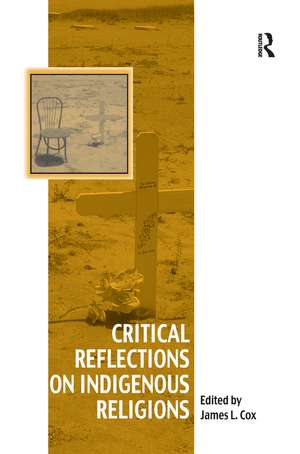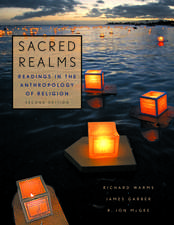Critical Reflections on Indigenous Religions: Vitality of Indigenous Religions
Editat de James L. Coxen Limba Engleză Paperback – 2 dec 2016
| Toate formatele și edițiile | Preț | Express |
|---|---|---|
| Paperback (1) | 469.34 lei 6-8 săpt. | |
| Taylor & Francis – 2 dec 2016 | 469.34 lei 6-8 săpt. | |
| Hardback (1) | 1055.69 lei 6-8 săpt. | |
| Taylor & Francis – 23 aug 2013 | 1055.69 lei 6-8 săpt. |
Din seria Vitality of Indigenous Religions
-
 Preț: 565.95 lei
Preț: 565.95 lei -
 Preț: 389.66 lei
Preț: 389.66 lei -
 Preț: 383.33 lei
Preț: 383.33 lei -
 Preț: 435.21 lei
Preț: 435.21 lei -
 Preț: 489.10 lei
Preț: 489.10 lei -
 Preț: 466.88 lei
Preț: 466.88 lei -
 Preț: 386.18 lei
Preț: 386.18 lei -
 Preț: 383.30 lei
Preț: 383.30 lei -
 Preț: 489.26 lei
Preț: 489.26 lei - 16%
 Preț: 338.33 lei
Preț: 338.33 lei -
 Preț: 380.78 lei
Preț: 380.78 lei -
 Preț: 416.22 lei
Preț: 416.22 lei - 18%
 Preț: 1109.18 lei
Preț: 1109.18 lei - 17%
 Preț: 257.25 lei
Preț: 257.25 lei -
 Preț: 379.86 lei
Preț: 379.86 lei -
 Preț: 489.26 lei
Preț: 489.26 lei -
 Preț: 394.19 lei
Preț: 394.19 lei -
 Preț: 489.26 lei
Preț: 489.26 lei - 17%
 Preț: 259.92 lei
Preț: 259.92 lei - 18%
 Preț: 1000.27 lei
Preț: 1000.27 lei -
 Preț: 449.41 lei
Preț: 449.41 lei - 18%
 Preț: 1000.27 lei
Preț: 1000.27 lei -
 Preț: 449.41 lei
Preț: 449.41 lei -
 Preț: 323.23 lei
Preț: 323.23 lei - 18%
 Preț: 1054.71 lei
Preț: 1054.71 lei - 18%
 Preț: 1109.18 lei
Preț: 1109.18 lei -
 Preț: 469.34 lei
Preț: 469.34 lei
Preț: 469.34 lei
Nou
Puncte Express: 704
Preț estimativ în valută:
89.81€ • 94.02$ • 74.31£
89.81€ • 94.02$ • 74.31£
Carte tipărită la comandă
Livrare economică 05-19 aprilie
Preluare comenzi: 021 569.72.76
Specificații
ISBN-13: 9781138251625
ISBN-10: 1138251623
Pagini: 216
Dimensiuni: 156 x 234 mm
Greutate: 0.45 kg
Ediția:1
Editura: Taylor & Francis
Colecția Routledge
Seria Vitality of Indigenous Religions
Locul publicării:Oxford, United Kingdom
ISBN-10: 1138251623
Pagini: 216
Dimensiuni: 156 x 234 mm
Greutate: 0.45 kg
Ediția:1
Editura: Taylor & Francis
Colecția Routledge
Seria Vitality of Indigenous Religions
Locul publicării:Oxford, United Kingdom
Cuprins
Contents: Preface; Part I Methodological Considerations: Reflecting critically on indigenous religions, James L. Cox; Why study indigenous religions?, Graham Harvey; Reflections on some problems in dealing with indigenous religions of the past: the case of pre-Christian Scandinavian religion, Jens Peter Schjødt; Religious traditions - kinship-based and/or universal?, Ulrich Berner. Part II European Contexts: Enlightenment concepts, medieval contexts, Carole M. Cusack; Druidry and the definition of indigenous religions, Suzanne Owen; Defining the religion that lay behind the self-colonization of Europe, Emily Lyle. Part III South American and African Contexts: Don Cristóbal, Llocllayhuancupa and the Virgin: the battle of words in a colonial Quechua conversion narrative, Sabine Dedenbach-Salazar Sáenz; The spirit White Feather in Sáo Paulo: the resilience of indigenous spirits in Brazil, Bettina E. Schmidt; Irreecha: an indigenous thanksgiving ceremony of the Oromo to the High God Waaqa, Gemechu Jemal Geda; Ritual and symbol: funeral and naming rituals in an African indigenous community, Elijah Obinna; Bibliography; Index.
Notă biografică
James L. Cox is Emeritus Professor of Religious Studies at the University of Edinburgh. From 1993 to 1998, he directed the African Christianity Project at the Centre for the Study of Christianity in the Non-Western World at the University of Edinburgh. Prior to his appointment in Edinburgh, from 1989 to 1993, he was Senior Lecturer in the Phenomenology of Religion at the University of Zimbabwe. His other academic posts have been at Alaska Pacific University and Westminster College, Oxford. He has published broadly in the fields of indigenous religions and methodologies in the studies of religion, including An Introduction to the Phenomenology of Religion (2010); From Primitive to Indigenous: The Academic Study of Indigenous Religions (Ashgate, 2007); He is past President of the British Association for the Study of Religions and is currently Deputy General Secretary of the European Association for the Study of Religions.
Recenzii
’From its inception, the discipline of religious studies adhered to a two-tier framework in which local, oral and ancestral religious traditions were subordinated in intellectual status and moral value to universal, textual and doctrinal ones. This wide-ranging and provocative volume marks a further decisive stage in the demolition of that framework. It will not conclude the debate about the definition of indigenous religions - for the contributors themselves engage with each other in that debate - but it will inform and sustain it for years to come.’ Brian Stanley, University of Edinburgh, UK
Descriere
The study of indigenous religions has become an important academic field, particularly since the religious practices of indigenous peoples are being transformed by forces of globalization and transcontinental migration. This book will further our understanding of indigenous religions by considering key methodological issues related to defining and contextualizing the religious practices of indigenous societies, both historically and in socio-cultural situations.











